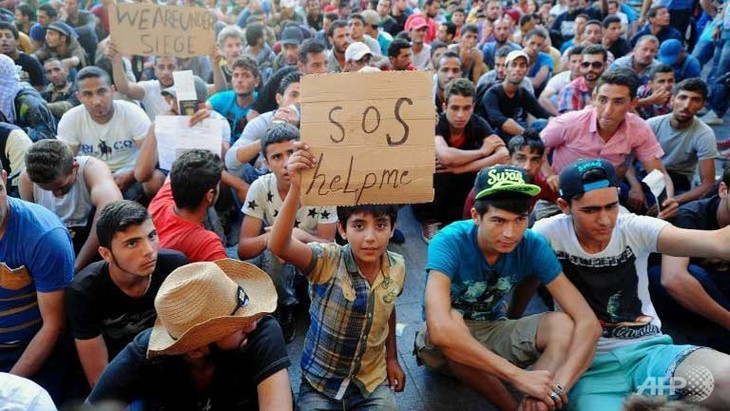(VOVworld) – Despite efforts to cope with migrant flows, EU countries haven’t been able to agree on a solution and the migrant crisis has undermined security in the host countries.
EU countries have tightened border security, established naval forces to stop human trafficking, negotiated an agreement with Turkey to accept migrants from other countries, closed the Balkan route, and expelled undocumented migrants.
But they haven’t found a comprehensive strategy for resolving the migrant crisis. At the UN summit on migrants in September, US President Barack Obama said the global migrant crisis is an urgent challenge that has pushed the EU into dangerous instability.
 |
Migrants sit in front of the Keleti (East) railway station in Budapest.
|
Dangers of the migrant crisis
Half as many people crossed the Mediterranean Sea to the EU in 2016 compared to 2015, but the number of people who died trying to cross the Mediterranean Sea reached a high record of 5,000, up nearly 25% from the previous year. Between piracy suppression operations and regular naval patrols, migrants took riskier routes to Europe. The number of child refugees without parents increased and many of those fell victim to child trafficking rings.
Migrants from Syria, Afghanistan, and Iraq accounted for 90% of the total. The thoughts of terrorists posing as refugees have alarmed many in the EU.
Differences in reactions
The migrant crisis has threatened to undermine EU stability but EU leaders continue to debate how to share the burden of receiving migrants. At the meeting of EU Ministers of Home Affairs in Belgium in November, German Miniser Thomas de Maiziere agreed that the EU has experienced deep divisions and differences. In 2015, the EU set the migrants quota for each member country, but a number of negotiations could not reach a final deal. Western European countries were ready to receive migrants, but Eastern European countries have rejected the quotas. They only agreed to provide financial or other kinds of contributions. Hungary and Slovakia have filed a lawsuit to the EU Court of Justice opposing the migrant quota.
The EU has strived to implement the agreement to reallocate 160,000 migrants, mostly Syrians, Iraqis, and Eritreans, who remain in Italy and Greece.
Amnesty International estimated that only 6% of the 66,000 migrants to Greece in 2015 had been reallocated to other EU countries. The others are living in overloaded refugee camps waiting asylum permission. Other countries have done nothing to break the impasse.